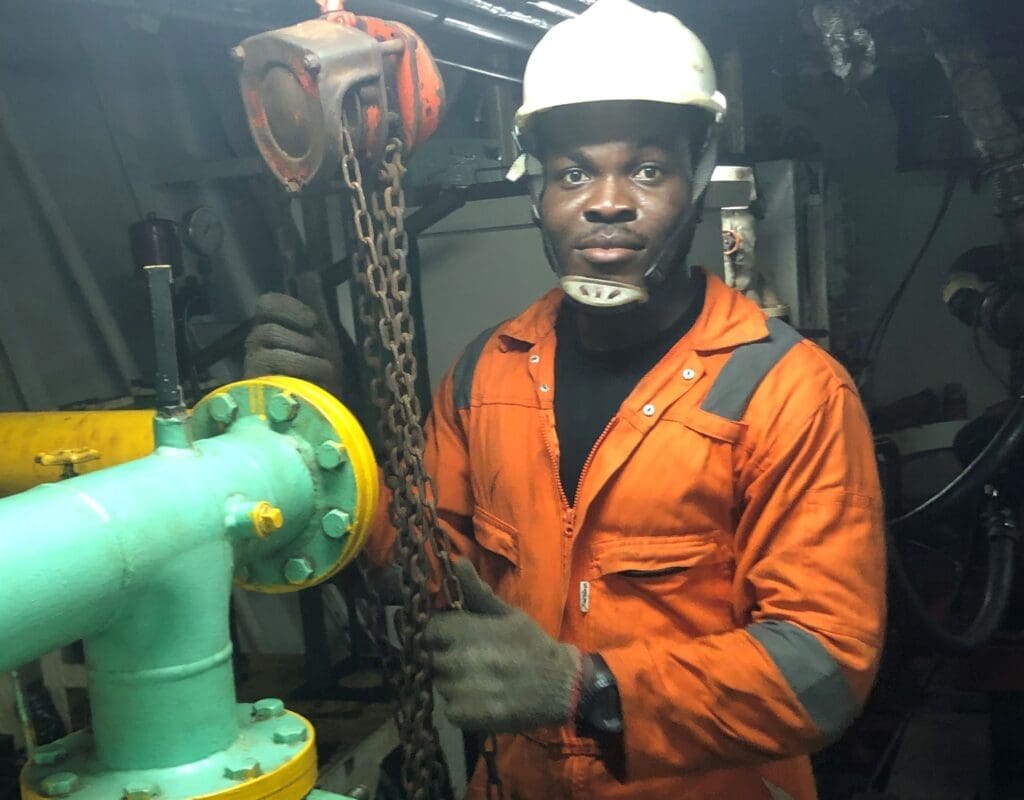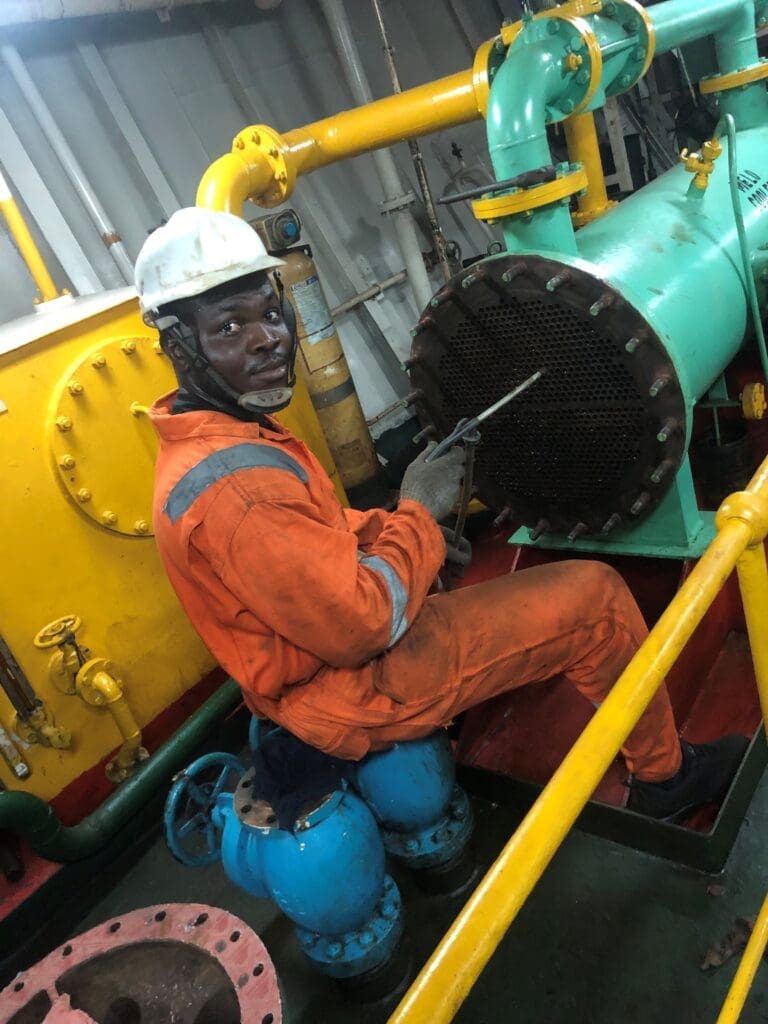Full life of an engine cadet in marine engineering
This article focuses on the life of an engine cadet in marine engineering. Harrison Ofoe Amewuda is starting his career as a marine engineer and following the maritime tradition of his uncles. Harrison is based in Accra in Ghana and studied marine engineering and naval architecture at the Regional Maritime University.


Spotlight on a marine engineer with a spirit to learn
Background and path to marine engineering and engine cadet
Could you give a brief description of your background and what led to your interest in engineering?
The interest began during my time in high school. I was supposed to be a business student, but I was transferred to the science class because I did well in mathematics and science subjects. Through that, I developed an interest in practical lessons. As well, I was always ready to use my hands to demonstrate and take things apart to see how they work.
Was there anyone in your family who guided you towards engineering?
Yes, my uncle Mr. Isaac Paafio Lotsa who is a sailor. He recommended Marine Engineering ahead of Navigation after I told him I had been offered science in high school. As well, I knew it would be a good fit for me.
Who do you consider is a great engineer?
As a marine engineer, I hope my answer is not too biased when I say this, but I believe that a great engineer should understand the working principles of all machinery and equipment they work with and devise innovative solutions to their challenges. All other fields of engineering require problem-solving skills, creativity, and a strong work ethic.


Marine Engineering and work as an engine cadet
Why did you decide to study naval architecture and marine engineering rather than a different type of engineering?
Growing up I wanted to work in a ship and go to sea because my uncles were seamen, and they were doing well. So, I knew it was a great way to make a living.
Studying Naval Architecture and Marine Engineering for me did not start with passion or aptitude with mathematics and science subjects. What was important for me was being the kind of person who enjoys whatever I do. If you enjoy it and want to do it, you will pick up the skills and practice you need even if it’s difficult because you will be willing to take on that challenge.
You had some internships while you were studying. What did you learn from your internships?
I worked as an intern at dry dock, and serviced controllable pitch propellers. On a pitch propeller, its internal mechanism enables those separate blades to be moved simultaneously to change the pitch. Until your ship visits the dock, you never get to see how the ship’s propeller or rudder, or other underwater fittings look installed so it is something special to take into my career as an engineer.
Why do you think internships are so important?
It helps you connect to your working environment, and you begin to appreciate all the lengthy lectures on what you were taught back in school. Through internships I gained my sea legs by going on board tugboats and pilot boats. Hence it has given a powerful beginning to my career.
Engineer onboard ship
Can you explain exactly what the engineering team including the marine engine cadets onboard a ship is responsible for?
The marine engineering team onboard see to the daily preventive maintenance of the main engine and its auxiliaries. The auxiliary machinery covers everything onboard except the main engine and boilers and includes almost all the pipes and fittings as well as many types of equipment.
What sort of equipment are you maintaining?
We maintain a lot of equipment including.
Diesel generating engines,
different types of pumps,
coolers,
condensers,
air compressor,
purifier,
refrigeration, heating, and ventilation systems,
sewage plant,
steering system,
electric motors,
turbocharger
and others.
What type of engineering do you do on the ship?
Ship operations engineering. At the end of the day, we apply a number of different engineering sciences from mechanical to electrical and electronics engineering and computer science to achieve propulsion and steering.


New skills
How do you obtain new skills while you are working?
I try to imitate senior engineers and also choose my study materials and manuals carefully.
Which people do you learn from?
Everyone, they all have different experiences from different ships.
What do you do when faced with a difficult technical problem?
I refer to the manuals and if it is beyond my understanding, I contact the experienced engineers.
Typical day at sea as an engine cadet in marine engineering
What’s your typical day like?
When the ship is at anchorage, I report to the engine room at 0400hrs, and I inspect the auxiliary machinery that has been running overnight. If all the readings are good, then I look out for any leakages and check the bilges to see whether I need to run the bilge pump. I also get the big generator ready for a changeover and do cleaning where necessary.
At 0700hrs I go for breakfast in the mess and then report back to the engine control room to continue my watch.
Between 0800hrs to 0830hrs is an engine room meeting where we discuss the repairs and maintenance to be done for the day.
Before sailing, I sound to the bunker tanks to check the fuel level and compare readings to their corresponding figures in the bunker book. This helps me to know the amount of fuel we have and if it is enough for the next voyage. I also check the level of lube oil in the engine sump, CPP (Clean Petroleum Product) tank and top up expansion tank, service tanks if required. In addition, I inspect, clean, and replace strainers and filters where necessary.


Shifts and free time
Do you work on a shift basis?
When sailing, we keep watches for 4 hours. During my watch which is between 0400 to 0800 and 1600 to 2000 hours I monitor the fuel level in the service tanks. When the fuel level is low, I do fuel transfer from the settling tank to the service tank and refill the settling tank with fuel from the bunker tanks. I record all the temperature and pressure readings that need to be recorded into the engine log books every hour.
At harbour, I mostly monitor the air pressure and supply to the cargo pump.
What do you do when you are not working?
I rest, make calls with family, and loved ones. I don’t like to miss out on them, so I try as much to connect with them and pay attention to all details concerning them. An example is their birthdays, school reopening, vacations, and graduation. I also watch training videos when I get the opportunity, this helps to learn more about my trade.
Protective clothing for an engine cadet in marine engineering
What sort of protective clothing do you need to wear as an engineer on a ship?
You are always wearing your boiler suit with safety boots and helmets with additional safety gloves, ear protection depending on where you are working or the hazards you are exposed to at that time.
Most challenging part of the job when at sea
What do you find most challenging when you are working – technical side, other people, or logistics?
It is challenging with my ship, during replenishment at sea, all the engineers are to standby for further tasks at the deck. It is also challenging when there is a fault and we don’t have the requisition to fix the problem but have to improvise until we get to our next port of call. Some systems need immediate fixing when faulty and that can be challenging at times.
Is your role ever uncomfortable because of heat, cramped spaces, bad lighting etc?
When you are on duty, you should forget about your comfort and perform your tasks with maximum accuracy. The engine room poses a lot of hazards and there are hot pipes everywhere, so you need to be alert and focused at all times. You have to make good use of your senses to detect any potential hazards and whenever you are in doubt you can always call the most senior engineer.
What is more difficult when at sea compared to on land?
The difficulties at sea are that there are no weekends or holidays. Every day is a working day and you have to be ready. Bad weather and poor internet also make you uncomfortable.
How do you cope with the lack of space and privacy when you are at sea?
Now the ships are designed with better accommodation and comfort. There are not many people on my ship so there’s enough space to keep your belongings and the ventilation system is good.


Advice for new engineers considering working on a ship as an engine cadet or marine engineer
What advice would you give to new marine engineers:
In their first week?
First week on a ship is normally for familiarisation so you should know your ship and all emergency procedures and escape routes. Get to know how to take over and handover a watch. Be familiar with radio communications between bridge to engine room and also deck to engine room. Keep asking questions like:
‘Why is it designed like that?’ or
‘Why did they do it that way?’
In their first month?
At the end of the month, you should be comfortable in the engine room and should have traced all the lines and piping systems to know which valves to open and close during transfers. Be eager to use your hands and take things apart to find out how they work. Finally, be diligent in watch keeping routines and conduct proper rounds in order to help detect potential issues early and prevent disasters.
In their first year?
At the end of the year, you should know the appropriate tools and techniques to use in solving problems. You should also have contributed well enough to the team’s task and read the manuals on the ship’s machines. Never stop learning because the ship is too big for you to know everything.
Key skills for an engine cadet and marine engineer
Apart from a strong technical background, what are the three most important skills to have?
You must have adaptability skills, you must pay attention to detail and be physically fit or active at all times.
How important are people and communication skills?
It is a team effort, so communication is very important. When given instructions, you repeat the instruction back to the person who gave it for the person to know and be sure that you understand what is said and will comply. That is how serious we take communication onboard a ship.
Conclusion to life of an engine cadet in marine engineering
I wish to use this opportunity to say thank you to The Field Engineer for the opportunity to share my experience on board.
I would also like to request that recruiters and shipping companies should help get placements onboard vessels for maritime students of the Regional Maritime University in Ghana. Most cadets are inexperienced with no proper hands-on experience while in college. There are agreements between shipping companies and the university but not enough to offer job opportunities for all these cadets.
Also, to my fellow engineering, deck and electrical cadets, never give up, keep searching, very soon your recruiter will locate you.


Responses